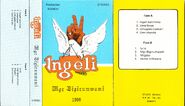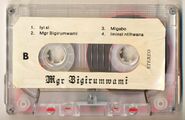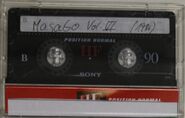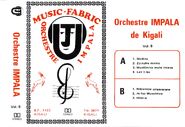Introduction[]
The music of Rwanda largely consists of African folk music sung by its people. Traditional music and dance are taught in "amatorero" dance groups, which are to be found across the entire country. The most famous of those is the National Ballet Urukerereza [1], which was created in the early 1970s to represent Rwanda in international events. Also famous were the Amasimbi n'amakombe and Irindiro dance groups. The ikinimba is probably the most revered musical tradition in Rwanda. It is a dance that tells the stories of Rwandan heroes and kings, accompanied by instruments like ingoma, ikembe, iningiri, umuduri and inanga. The inanga, a lyre-like string instrument, has produced many of Rwanda's bestknown performers, including Rujindiri, Sebatunzi, Rwishyura, Simparingoma, Sentoré, Kirusu, Sophie and Victor Kabarira, Simon Bikindi. ... Due to socio-military unrest and violence, many Rwandans have moved overseas in recent years, bringing their country's music to cities like Brussels[1]. For many years, Rwandan-Belgian Cécile Kayirebwa was arguably the most internationally famous Rwandan musician, until the late 1990s arrival of Rwandan-Canadian Corneille and Jean-Paul Samputu. Before the chaotic 1990s, Rwanda produced popular local bands like Imena, Nyampinga, Les 8 Anges, Les Fellows, Impala, Abamarungu, Los Compagnons de la Chanson, Bisa, Ingenzi, and Isibo y'Ishakwe. They took influences from across Africa, especially the Congo, as well as Caribbean zouk and reggae. [2]
The 1980s[]
It seems that popular (dance) music started in Rwanda not before 1980. Some of the above mentioned groups had cassettes released during the 1980s. The overall output of commercially produced music was low [3] The most productive group and the best sponsered and protected group were Orchestre Impala who had most probably a quasi official position under then president Habiyarimana. Several factors were responsible for this situation, among them general poverty, low urbanization and electrification, and also a certain dislike for entertainmaint within the official politics. There was no TV, one state run radio program which played more traditional music and only some french pop mixed with the music of Rwandan bands. Cassettes were marketed by a handful of shops in Kigali (music-fabric), Butare and Gisenyi. Along the rwandan tapes some cassettes apeared in a series under the logo "African Hits"
Artists & Discographies[]
Annonciata Mutamuliza "Kamaliza"[]
- Humura Rwanda (MC); Tracks: A: 1. Humuna Rwanda / 2. Iby'ly'lol / 3. Mbabare ngiee nle? / 4. Laurentie // B: 5. Ni muve mu nzira / 6. Shira lye ntimba / 7. Maragahinda / 8. Mutamuliza / 9. Ntzakumara ... [4]
Ben Kayiranga[]
Born 1967 à Gisenyi. First records in the 1990s. In 2000 collaboration avec Sonia Rolland, in 2002 with Lokua Kanza. [5]
- Ninde (avec Jean-Christophe Matata et Nzongo Soul) Tracks: 1. Ninde Undirije Umwana / 2. Liberté / 3. Ngwino / 4. Le Coup de Poing du Diable / 5. Wirira / 6. Dushaka Amahoro / 7. Mukamabano
- Mbabarira, 1998; Tracks: 1. Afrika / 2. Eléa Nkunda / 3. Freedom (remix) / 4. Iyizire / 5. Mbabarira / 6. Ndagukeneye / 7. Now And Then / 8. Pendo Lanitesa
Bizimungo Dieudonné[]
- Bizimungo Dieudonné accompagné par Kagambage Alexandre : Inovu Y’Imirindi. Musique Rwandaise (MC : o.L.); Tracks : Face A : 1. Inzovu y’imirindi / 2. Imbabazi twese / 3. Urujeje rw’imisozi 1000 No. 1 / 4. Tabara ryangombe // Face B : 1. Inyange ibarusha kwera / 2. Urujeje rw’imisozi 1000 No. 2 / 3. Ibango ry’ibanga / 4. Ikirezi
"As I listened to his music, I started asking Rwandan colleagues, journalists and musicians about him. It seems that today Bizimungu Dieudonne is largely forgotten. His music is no longer played on Rwandan radio and he has faded from popular memory. Here is what I have learned about him. Bizimungu Dieudonne was a Rwandan civil servant who loved music, a passion he inherited from his father (who may have performed religious music). Bizimungu usually performed, throughout Kigali, with his wife Agnes Uwimbabazi. In 1994 they were both killed (along with many of Bizimungu Dieudonne's family members) by Hutu militias during the Rwandan genocide. {C The song "Tabara Ryangombe" is a masterpiece. This song was recorded in the late 1980's (I don't have an exact date). In it Bizimungu asks Ryangombe (the spiritual father of the Rwandan people) to save the young. He sings "the children of Rwanda no longer respect the values of their ancestors. They want red lips and fingernails. Ryangombe bring back the pride of our lost families. Oh, our God that looks over Rwanda come save your palace. Parents, pray that we don't lost our culture. And you, the young ones, obey your parents ". {C Check out Kagambage Alexandre's stuttering guitar playing!!"[6]
Cecile Kayirebwa[]
- Nouveau nouvel élan Ubumanzi (MC: CK04), released in Begium [7]
Fellows[]
- Fellows 1 Brigitte 85 (MC: Audiotex Studio /Kigali, Rwanda), 1985; Tracks: A: Brigitte 85 / 2. Umunsi Mwiza / 3. Nta Mpuhwe Ukigira / 4. Isuka // B: Bonne Annee / 2. Mukobwa Ntukarakare / 3. Semblables Aux Images / 4. Gufuha; 1ère édition. Made in Rwanda [8]
Ingeli[]
Both Cécile Kayirebwa and Jean-Paul Samputu started with this orchestra in the 1980s.
- Ingeli : Mgr. Bigirumwami (MC: Production SODEVI /Gisenyi, Rwanda), 1986; Tracks: Face A: 1. Ingeli Balirimba / 2. Uwariboye / 3. Umugabo nyakuri // Face B: 1. Iyi si / 2. Mgr. Bigirumwami / 3. Migabo / 4. Iminsi ntihwana [9]
Manu Matabaro[]
- Manu Matabaro – E. Sekimonyo Acc. par Inono Stars: Umwana w’umunyarwanda (MC: o.L. / Kigali, Rwanda); Tracks: Face A: 1. Umwana w’umuyarwanda / 2. Ururabo / 3. Icyo nkundira mu kinyaga // Face B: Umwana utagira iyo ajya / 2. Amatage / 3. Imbabazi bambe [10]
Masabo[]
- Vols I to V (MC: unknown) [11]
- Vol. VI (MC: unknown), 1986; Tracks: A: 1. Kibuye / 2. Komera Kagaera / 3. Ibigina ibigina / 4. Mukerarugendo // B: 1. Intawari nibuka: 1er prix Solo Festival de paix, Août 1986 / 2. Ndaririmba / 3. Mutima ucyeye / 4. Mukamusoni / 5. Kigali 2000 [12]
Ngabonziza Augustin[]
- Ngabonziza Augustin & Les Citadins : Uburere Bwiza Vol. 2 (MC : UJ Uwimana Jean / Kigali, Rwanda); Tracks : Uburere bwiza / Ibrahim / Nateseka / Obugenyi / Mana duhe amahoro // B: Indwara y’urukundo / Mbwiz’ukuli / Emera ko ngukunda / Gira utahe / Nkumi nziza [13]
Nyiranyamibwa & Isamaza[]
- Ese Mbaze Nde - Memory Day (MC) Tracks: Side A: Ece Mbaze Nde / Cyo Nimwumve // Side B: Umuvugo / Ese Mbaze Nde (instrumental) [14]
Orchestre Abamararungu[]
- Orchestre Abamararungu : Inanga Y’Amahoro Vol. 1 (MC : UJ Uwimana Jean / Kigali, Rwanda), Dec. 1987; Tracks : A : 1. Iserukiramuco / 2. Taxi / 3. Dore ishyano / 4. Saïdati // B: Yvette / 2. Uruyeye / 3. Nta nkovu y’uruvugo [15]
Imprimerie de Kigali
Orchestre Impala[]
- Orchestre Impala: Vol. 1 (MC: UJ Uwimana Jean /Kigali, Rwanda), Tracks : A : Yego Mama wararaye / Je pense à Toi / Uje haraka / Cyono ngwino / Nsanze uli Imparata / Carie d’Amore // B : Iyizire Kanyana Kanjye / Amavubi No II / Ni wowe Tuberanye / Ndacyagukunda; Réallisation sonore : Jacquues Bigot. Centre d’Echange Culturel Franco-Rwandais. [16]
- Orchestre Impala de Kigali (MC : o.L.) [17]; Tracks : A : 1. Présentation / 2. Ninde undilfje umwana / 3. Philos / 4. Iso ninde ? / 5. Qui de vous filles … // B : 1. Dushishikalire guhinga / 2. Nkumbuye Umwana … / 3. Maria Nyiranziza / 4. Adieu ma jolie Pudence / 5. Mbega ibyago / 6. Ubaye uwande; Edité par l’Orchestre Impala avec la collaboration Technique de Jean Uwimana. Imprimé par l’ORINFOR (SECOMAV) [18]
- Orchestre Impala Kigali Rwanda : III (MC : UJ Uwimana Jean /Kigali, Rwanda); Tracks : A : Uribeshya / Umugwaneza / Amavubi No 1 / Unaenda wapi // B : Ntugasaze / Soko kw’iteke / Goretti / Ngwino Mutimukeye; Edité par L’Orchestre Impala avec la collaboration Technique de Jean Uwimana. Imprimé par ORINFOR (SECOMAV) [19]
- Impala de Kigali : La musique n’a pas de frontière … Vol. 6 (MC : UJ Uwimana Jean); Tracks : A. Mbwira ijambo limwe / Mu rusisiro rw’iwacu / Iby’isi n’amabanga / J’ai bien choisi // B : Nyiramaliza / Nyirabasare / Mwali uralizwa n’iki ? / Muntegetse iki ? [20]
- Orchestre Impala de Kigali : Une Sélection de l’Orchestre Impala Vol. 7 (MC : UJ Uwimana Jean /Kigali, Rwanda); Tracks : A : Cyono ngwino / Intwali yaratabaye / Qu’as-tu fait de ma vie / Ninde undilije umwana / J’i bien choisi // B : Soko kw’iteke / Ni wowe tuberanye / Iyizire Kanyana kanjya / Nkumbuye umwana twareanywe / Adieu ma jolie Prudence / Umugwaneza [21]
- Orchestre Impala de Kigali : Vol. 8 (MC : UJ Uwimana Jean / Kigali, Rwanda), ca. 1986; Tracks : A : Madina / 2. Zainabu mama / 3. Mushimira mute Imana / 4. Let it be // B: 1. Niboneye urwererane / 2. Je fus Musulmn / 3. Hilaria
References[]
- ↑ For more detail on thios group and their activities, see: Rwandagateway, 29.5.2012
- ↑ Wikipedia, retrieved 7.4.2010; not for all of the above mentioned groups we could find proove in form of tapes, other sound or written documents.
- ↑ Mathew Lavoie couldn't find more than a dozen of cassettes in the vaults of the archive of Voice of America, see African Music Treasures, 20.11.2007, retrieved 15.12.2008
- ↑ A copy is located at the African Music Archive, Mainz with Cat.-No. Af6TK829
- ↑ Le Nouvel Afrique Asie No. 173, Fév. 2004, p. 66; http://www.myspace.com/beniwe at My Space], 17.9.2012
- ↑ Matthew Lavoie, s.a.
- ↑ A copy is located at the African Music Archive, Mainz with Cat.-No. Af6TK508
- ↑ Dial Africa blog, 27.12.2010, 28.12.2010
- ↑ Dial Africa blog, 24.9.2011, 24.9.2011
- ↑ Dial Africa blog, 20.10.2010, 20.10.2010
- ↑ The existence is most probable, see Vol. VI
- ↑ A copy is located at the African Music Archive, Mainz with Cat.-No. Af6MC18
- ↑ Dial Africa blog, 21.7.2011, 21.7.2011
- ↑ A copy is located at the African Music Archive, Mainz with Cat.-No. Af6TK828
- ↑ Dial Africa blog, 8.3.2011, 8.3.2011
- ↑ Dial Africa blog, 5.11.2010, 5.11.2010; a copy of this tape is located in the African Music Archive, Mainz, Sig.: Af6MC16
- ↑ In the African Music Archive at the University of Mainz a copy of this edition is marked "Vol. 2" (Signiture: Af6 MC17).
- ↑ Dial Africa blo, 24.9.2010, 10.12.2010; a copy of this tape is located in the African Music Archive, Mainz, Sig.: Af6MC17
- ↑ Dial Africa blog, 14.4.2011, 14.4.2011
- ↑ Dial Africa blog, 13.5.2011, 15.5.2011
- ↑ Dial Africa blog, 20.12.2011, 20.12.2011






























